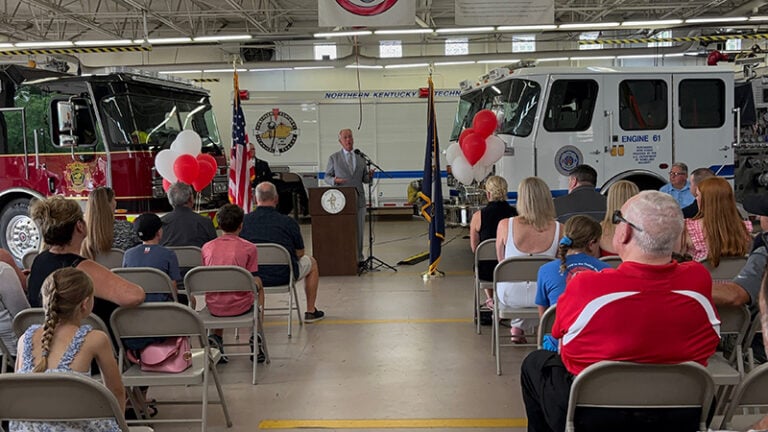By Patricia Scheyer
NKyTribune reporter
The monthly Kenton County Mayors’ group met at Crestview Hills Saturday after a month off, and much of the conversation was about the recent election.
Covington Mayor Elect Ron Washington said everything went smoothly in his city.
“As you know, the mayor/council initiative passed, the citizens passed it,” he said. “So we’ll transition in the next few years. We will name a transition committee in January.”
The initiative was put on the ballot by a five-citizen committee, including Richard Dickmann, Daphne Jones Conde, Jerry Avery, Michael Beeby, and Robin Williams, who gathered enough signatures from residents to request that the initiative be on the ballot. Their reasoning was that the Mayor/council form of government was less antiquated than the city manager government and would move the city forward in its quest to be a more modern city. Some of the push came from the group Covington Forward.

The present form, they felt, spread out the power of the government, and although the mayor represented the face of the city, and he was able to sign contracts and run meetings, he really was only one vote for most other actions. With the new form of government, the mayor will be able to hire and fire city workers, other than police and fire, and generally have more authority on a day-to-day basis.
Interestingly, nationwide most large cities have the city manager type of government. Statistics show that over 50 percent of cities that have over 10,000 residents have the city manager type of government. In the state of Kentucky, however, over half the cities have the mayor/council type of government. In Northern Kentucky, both Newport and Taylor Mill like and perform well with a city manager type of government. There was opposition to the effort, which was reflected in the approximate 60 to 40 percent vote tally.
Amanda Peters from the Northern Kentucky Office of Drug Control, talked about her quest to build a force of Police Social Workers.
“We’re actually calling them Law Enforcement Navigators here in Kenton County,” she explained. “The cost for one of these positions is about $100,000.”
She said the county is asking for a two-year commitment for anyone wanting to pursue the position, so that they can have proper evaluation. Peters said she has been going around to cities and fielding questions about the position, and she said the county is willing to cover any gap funding. Other cities asked about funding and she said they can work with the city administration if they want to move forward with the program.

“The funding can be used for mental health,” she said. “So we’re looking at overdoses, and addiction kind of issues, but the funding can be used for mental health disorders as well, so that brings in domestic violence, and other issues.”
Peters said her staff is trying to make the rounds to all the cities in Kenton County to talk with everyone.
“Our help line receives about 3,000 calls a year,” she said. “We are working with Kenton County Dispatch, and I can tell you that about 60 to 80 percent of the calls that come in are not about criminal behavior, they are more about social calls. So that’s what we’re looking to do, to take the burden off, of course trying to save lives, but also to use the taxpayer money to reduce the burden.”
She said this is a true collaboration, nothing is set in stone, but people can contact her or Stacy Tapke, to get more information.
If all goes as planned, Peters said that they hope to have 17 positions across Boone, Kenton, and Campbell counties.
“This is new,” she emphasized. “We’re still figuring this out.”
Around the state, she said, there are 25 positions. Campbell County will have six to eight, although Fort Thomas would not be covered. Newport is still weighing their options, she explained, but Boone County has three, and currently in Kenton County there are four, but they are hoping to expand that by five or six.
She brought up a related issue.
“I want to say we have free naloxone for your cities and organizations, and we can come out and train,” she said. “We recently came out and trained Edgewood and that night they had an overdose, and they were able to save a life.”
She said she is trying to get the information out there that her office is here to help and might save the cities and counties some resources so they can use them for other purposes.
Peters said that the number of fatal overdoses in the three Northern Kentucky counties remained the same from 2022 to 2023, totaling 141 both years. But there was a change in the number of overdose numbers by county. Boone County had a 14 percent decrease, and Campbell County had a 25 percent decrease while Kenton county experienced a 23 percent increase. Peters said that helping the police and fire departments keep naloxone on hand could help those numbers.

















